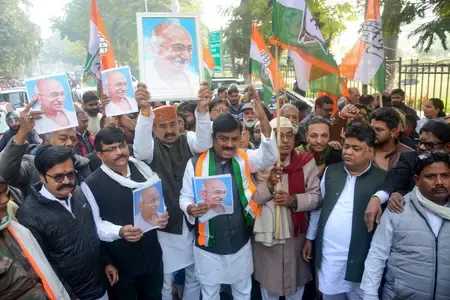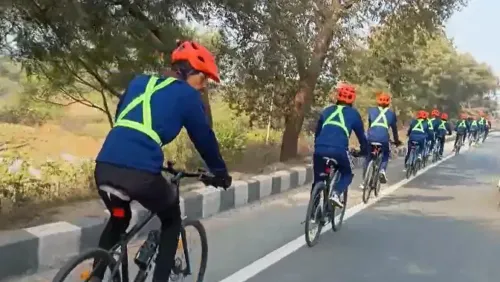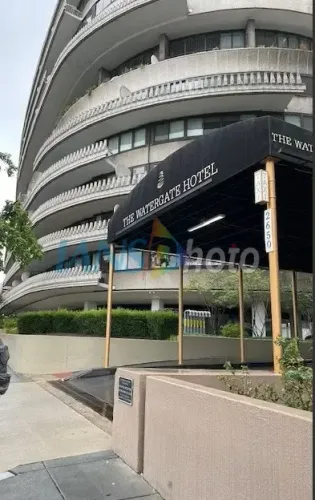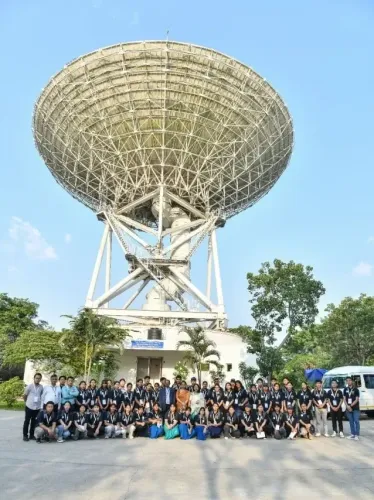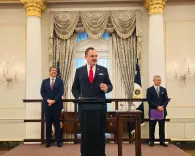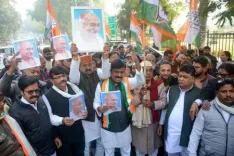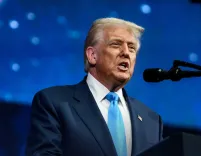PM Modi Highlights the Essential Role of Civil Servants in Attaining Viksit Bharat on Civil Services Day
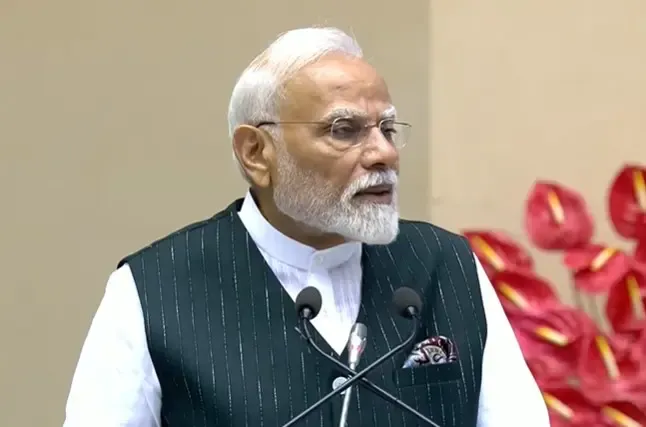
Synopsis
Key Takeaways
- PM Modi praised civil servants for their unwavering dedication.
- He highlighted the importance of modern approaches in governance.
- The theme for this year’s Civil Services Day is 'Holistic Development of India.'
- The Prime Minister presented awards for excellence in public administration.
- India is focusing on transformative changes for Viksit Bharat 2047.
New Delhi, April 21 (NationPress) Prime Minister Narendra Modi on Monday addressed the 17th Civil Services Day event in the capital, commending the unwavering dedication of India’s civil servants and emphasizing their pivotal role in achieving the vision of a ‘Viksit Bharat.
Speaking at Vigyan Bhawan, PM Modi paid heartfelt tributes to Sardar Vallabhbhai Patel, recalling his historic 1947 address where he referred to civil servants as the “steel frame” of the nation.
“This Civil Services Day is noteworthy for various reasons. We are marking 75 years of our Constitution and the 150th birth anniversary of Sardar Vallabhbhai Patel. On April 21, 1947, he described you (civil servants) as the steel frame of India,” he remarked.
Reflecting on Patel’s vision, the Prime Minister stated, “He outlined the principles of a civil servant — one who serves the nation with integrity, discipline, democratic ethos, and commitment. These teachings of Sardar Patel are increasingly relevant as we progress towards the goal of Viksit Bharat.
PM Modi asserted that realizing the dream of Viksit Bharat necessitates synchronized efforts across all sectors.
“Our bureaucratic processes and policy-making cannot rely on outdated practices while the world is advancing rapidly. Our youth are growing up amidst swift technological advancements, with new devices emerging every couple of years. We must keep pace with this evolution,” he emphasized.
Highlighting essential growth areas for India — from clean energy to sports and space — the Prime Minister asserted, “The nation looks towards you (civil servants). You bear a significant responsibility to assist India in becoming the world’s third-largest economy. We must collaborate to achieve this objective.”
This year’s theme for Civil Services Day is ‘Holistic Development of India’, which the Prime Minister described as “no village left behind, no family left behind.”
He also presented the Prime Minister’s Awards for Excellence in Public Administration, honoring outstanding officials behind initiatives like PM Vishwakarma, Poshan Tracker, Siksha Setu Axom, and Sugamya Pustakalaya.
“Good governance is not measured by the number of schemes but by the tangible impact it creates,” he stated. Citing examples, he referred to districts where solar energy and enhanced attendance systems have yielded positive outcomes and applauded the efforts of public administrators nationwide.
He added that over the past decade, India has progressed beyond incremental improvements to transformative changes.
“Today, India’s governance model emphasizes next-generation reforms. Through technology and innovation, we are narrowing the gap between the government and citizens. These transformations are evident not just in urban and rural regions but also in remote parts of the country,” he remarked.
PM Modi mentioned Bhagalpur in Bihar, where the registration of pregnant women in Jagdishpur block surged from 25% to over 90%. In Marwah block of Jammu and Kashmir, institutional deliveries rose from 30% to 100%, showcasing enhanced healthcare accessibility.
Discussing India’s global leadership, the Prime Minister highlighted the extensive reach of its G20 presidency. “For the first time in G20 history, over 200 meetings were conducted across more than 60 cities, establishing a broad and inclusive presence. This embodies the holistic approach of today’s India,” he explained, adding, “India is not merely participating — India is leading.”
He noted that while numerous nations are now discussing government efficiency, India is already a decade ahead. “We have eradicated delays and are instituting new procedures. Over 40,000 compliance requirements have been eliminated to enhance the ease of doing business,” he stated.
The Prime Minister recalled early resistance to reforms, including compliance reductions and the decriminalization of business mistakes.
He asserted that the foundation established over the past decade has significantly strengthened the trajectory towards Viksit Bharat 2047.
“We cannot assess our achievements or performance by juxtaposing it with earlier administrations... We must create our own metrics. It is crucial to gauge how far we are from the target of ‘Viksit Bharat by 2047. The time for tallying our current accomplishments has elapsed.
“India has now become the most populous nation globally. Ensuring the saturation of fundamental facilities must be our utmost priority,” the Prime Minister added.
“In the last decade, we constructed 4 crore (40 million) permanent houses for the underprivileged, but we now aim to build an additional 3 crore. We have provided tap water connections to 12 crore households in just 5–6 years. Our goal now is to guarantee that every household has immediate access to tap water. Over the past ten years, we have built over 11 crore toilets for the economically disadvantaged. We must now swiftly attain new objectives related to waste management,” he noted.
Additionally, he launched two e-books — Holistic Development of Districts and Select Innovations — and recognized the top-performing districts in initiatives like Ayushman Bharat Yojana, PM Vishwakarma Yojana, Har Ghar Jal, and PM Awas Yojana.
Awarded districts included Rajkot in Gujarat, Gomti in Tripura, Tinsukia in Assam, Kupwara in Jammu and Kashmir, and Koraput in Odisha.
Blocks acknowledged under the Aspirational Block Programme included Gamharia (Jharkhand), Parappa (Kerala), Narnoor (Telangana), Ganganagar (Tripura), and Rama (Madhya Pradesh).


